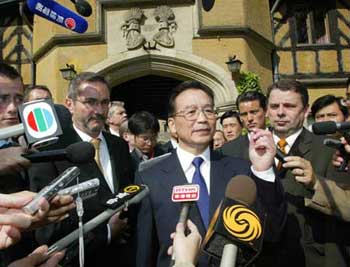|
Wen: "One China" now a universally accepted principle
(Xinhua)
Updated: 2004-05-04 14:03
Visiting Chinese Premier Wen Jiabao said on Monday that the Potsdam Proclamation has made it clear that Taiwan is an inalienable part of China and the "one China" principle has been universally accepted by the international community.

Visiting Chinese Premier Wen Jiabao speaks in at the yard of the Castle Cecilienhof in Potsdam May 3, 2004. Wen was on his three-day official visit to Germany.[Xinhua] |
He made the remarks while visiting the Cecilienhof Palace in Potsdam, where the famous Potsdam Proclamation was signed in 1945.
The proclamation stipulated that "terms of Cairo Declaration shall be carried out." The declaration noted that "all the territories Japan has stolen from the Chinese, such as Manchuria, Formosa, and the Pescadores, shall be restored to China."
The Chinese premier, who is on a three-day official visit to Germany, told reporters that the Cecilienhof Palace, where the Potsdam Proclamation was signed, is of historical significance to China.
The Potsdam Proclamation has made it clear that Taiwan is an inalienable part of China, Wen said, adding that the returning of Taiwan to her motherland after the Second World War was due to the defeating of evil by justice. "It was also the common victory of all peace and justice cause-loving countries and peoples all over the world," the Chinese premier noted.
The 1943 Cairo Declaration, the 1945 Potsdam Proclamation and the UN Resolution 2758 passed at the 26th General Assembly in 1971 had all affirmed Taiwan's legal status as an inalienable part of China, and the "One China" principle has been universally accepted by the international community, Wen said.
He said he is convinced that Taiwan will eventually be reunited with its motherland. It is an inevitable outcome of history and no force could hinder it, Wen added.
Before his visit to Cecilienhof Palace, the Chinese premier met with Minister-President Matthias Platzeck of Brandenburg. Wen said his current visit to Brandenburg have three purposes:
-- Showing China attaches importance to develop relations with Brandenburg;
-- Visiting the Cecilienhof Palace to show China's aspiration of peaceful development;
-- Reviewing the Potsdam Proclamation on Taiwan is an inalienable part of China and making clear China's firm determination in safeguarding the reunification of the motherland.
Platzeck expressed support to China's reunification cause and said Brandenburg is willing to forge closer ties with China's relevant provinces and expand cooperation in areas of agriculture and environment protection.
The Chinese premier flew into Berlin's Tegal Airport on Monday morning after his visit to Bavaria. He then went straight to visit a gas turbine engine plant owned by Siemens.
On Monday afternoon, German Chancellor Gerhard Schroeder hosted a welcoming ceremony in Wen's honor. Then the two leaders began to hold talks to exchange views on Sino-German ties and issues of common concern. They will attend a signing ceremony on several cooperation agreements and meet the press following their talks.
Schroeder will host a welcoming banquet in Wen's honor on Monday evening.
The Chinese premier kicked off his 11-day five-nation European tour on Sunday by arriving in Germany's southern city of Munich.
Germany is the first leg of the Chinese premier's visit which will also take him to Belgium, Italy, Britain and Ireland. He will also pay a visit to the European Union headquarters in Brussels.
|